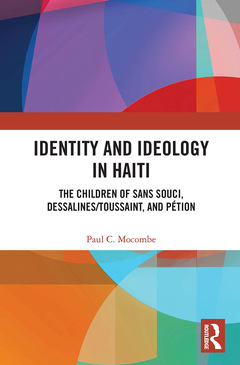Identity and Ideology in Haiti The Children of Sans Souci, Dessalines/Toussaint, and Pétion
Auteur : Mocombe Paul C.

Using a structurationist, phenomenological structuralism understanding of practical consciousness constitution as derived from what the author calls Haitian epistemology, Haitian/Vilokan Idealism, this book explores the nature and origins of the contemporary Haitian oppositional protest cry, "the children of Pétion v. the children of Dessalines." Although traditionally viewed within racial terms ? the mulatto elites v. the African (black) poor majority ? Mocombe suggests that the metaphor, contemporarily, as utilized by the educated black grandon class (middle-class bourgeois blacks) has come to represent Marxist categories for racial-class (nationalistic) struggles on the island of Haiti within the capitalist world-system under American hegemony. The ideological position of Pétionrepresents the neoliberal views of the mulatto/Arab elites and petit-bourgeois blacks; and nationalism, economic reform, and social justice represent the ideological and nationalistic positions of Dessalines as articulated by the grandon, actual children of Toussaint Louverture, seeking to speak for the African majority (the children of Sans Souci, the Congolese-born general of the Haitian Revolution) whose practical consciousness, the Vodou Ethic and the spirit of communism, differ from both the children of Dessalines and Pétion. In the final analysis, the moniker is a truncated understanding of Haitian identity constitution, ideologies, and their oppositions.
Introduction 1. The Children of Sans Souci, Dessalines/Toussaint, and Pétion 2. Phenomenological Structuralism 3. The Protestant Ethic and the Spirit of Capitalism 4. The Vodou Ethic and the Spirit of Communism 5. Lakouism and Capitalism 6. Conclusions: "The My Nigga Haitian"
Paul C. Mocombe is a former Visiting Professor of Philosophy and Sociology at Bethune Cookman University, Assistant Professor of Philosophy and Sociology at West Virginia State University, and the President/CEO of The Mocombeian Foundation, Inc.
Date de parution : 08-2022
15.2x22.9 cm
Date de parution : 04-2018
15.2x22.9 cm
Thème d’Identity and Ideology in Haiti :
Mots-clés :
Social Class Language Game; social; Material Resource Framework; class; Petit Bourgeois Blacks; language; Global Capitalist World System; game; Mulatto Elites; material; Sans Souci; resource; Ideological Apparatuses; framework; African Masses; ideological; Haitian Nation State; apparatuses; Haitian Idealism; practical; Practical Consciousness; Discursive Practices; Toussaint Louverture; Jean Jacques Dessalines; Creole Blacks; Extra-sensory Perceptions; Extrasensory Perceptions; Boukman Dutty; Transcendentally Real Concepts; Rada Tradition; Subatomic Particles; Phenomenal Properties; Phenomenological Structuralism; Maroon Africans; Upward Economic Mobility



